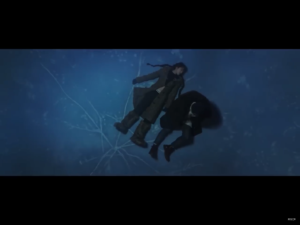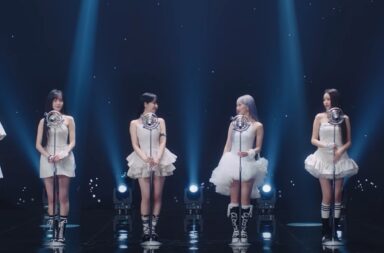
In her first year, Yena made a name for herself as the pop-punk princess — driving guitars and sarcasm mixed with bubblegum pop, all wrapped up in a with a defiant sense of optimism. She was happiness and positive outlooks because of the things that went wrong in her life. Yet, all artists feel the need to experiment, and expand their range, which Yena has done with her latest comeback, “Love War”. Unfortunately, Yena has moved away from the distinct in favor of something that is solid, but indistinct.
“Love War” is not a bad MV, or a bad song. There are a lot of clever ideas present that elevate it beyond a typical break-up track. For one, it really leans into the darkness that comes when a relationship turns sour; when the positive emotions have faded but the intensity remains. There is a great deal of violent imagery, both literal and implied. Yena’s cut and bloodied face, the plethora of gelatinous red foods and sharp implements, the near-constant presence of knives and guns; it all builds a sense of tense uneasiness that is abruptly cut off when Yena’s plans to shoot her ex are ruined when she is hit by a car. Much like in real life, the hints of violence start slow and build, stewing alongside Yena’s frustration and anger until it boils over.
The violence plays off well against the mise-en-scene. Everything is black, brown, grey, and most of all, dark. Even in flashbacks to the relationship, which favor an orange color palette, there is still an overwhelming need to turn on a lamp. Yet, this perfectly sets the tone for Yena’s rage. Typically, light is associated with warmth and happiness; blue light is often used to strip these out while still brightly lighting a scene. By eschewing blue light in favor of literal shadows, it illustrates just how bad Yena’s relationship has become. She is sitting and seething in the dark, so wrapped up in the object of her ire that she either has not noticed or will not fix such a simple issue.

The song itself also shows a desire to move beyond the basics. While “Love War” is an R&B breakup track, it does not settle for Yena blaming her ex for things falling apart.
Instead, “Love War” argues that both parties in a relationship have to be willing to put in the work. BE’O takes the role of her boyfriend, taking her to task for blaming him for everything. He points out that she is demanding, paranoid, and not listening to him, and is therefore just as much to blame for things falling apart. This is backed up by the homages to Eternal Sunshine of The Spotless Mind, a film about a relationship that repeatedly craters because neither person is willing to admit their own flaws and hold themselves accountable, both instead choosing to make the same mistakes over and over.
Unfortunately, this is where “Love War” falters. The ideas are very good, but the execution falters. The biggest issue is BE’O’s verse. I am fairly certain that we are supposed to take his viewpoint seriously. The equal framing, Eternal Sunshine references, and Yena’s descent into madness all imply this. The issue is that his verse is a stereotypical checklist of shitty boyfriend behavior.

He’s busy working, that girl is just a work colleague, stop demanding attention, stop embarrassing him, this is your fault, we need space, go away, but now come here because I say so — it is every bad boyfriend cliche rolled into one. And while it is very possible that Yena is overly demanding of her partner’s time and energy, it does not come off that way.
Instead, it is a bleak reminder that women are expected to do the bulk of emotional labor in a relationship and take whatever crumbs are thrown their way. With sharper and less lazy lyrics, “Love War” could have been a pointed examination at the two-sided aspect of romance. As is, all it does is make the audience look at Yena and think “honey, he’s not worth this”.
The other big problem with “Love War” is with Yena herself, or the lack thereof. As said previously, it is a good track and MV, but it could have been made by any number of singers. There is nothing of Yena’s recognizable spark of personality in either. Moreover, the smooth R&B tone required has sanded down Yena’s distinct vocal color, to the extent that if you did not know it was Yena, you probably wouldn’t think it was her. So while “Love War” is undeniably solid and on trend, it is also anonymous.

“Love War” was a clear attempt for Yena to expand her range, both in terms of genre and mindset. And while the ideas have Yena’s trademark cleverness, they are let-down by the execution, resulting in a track that has unclear messaging and no sign of Yena herself.
(YouTube. Images via Stone Music Entertainment.)


